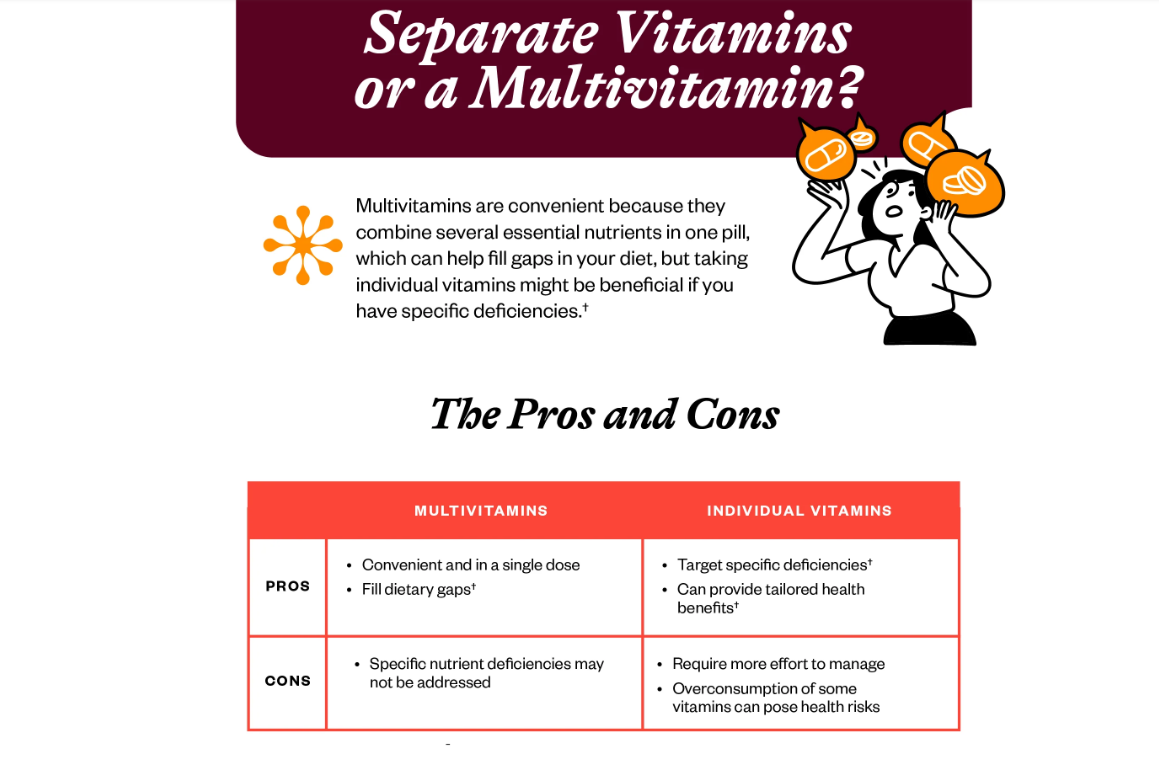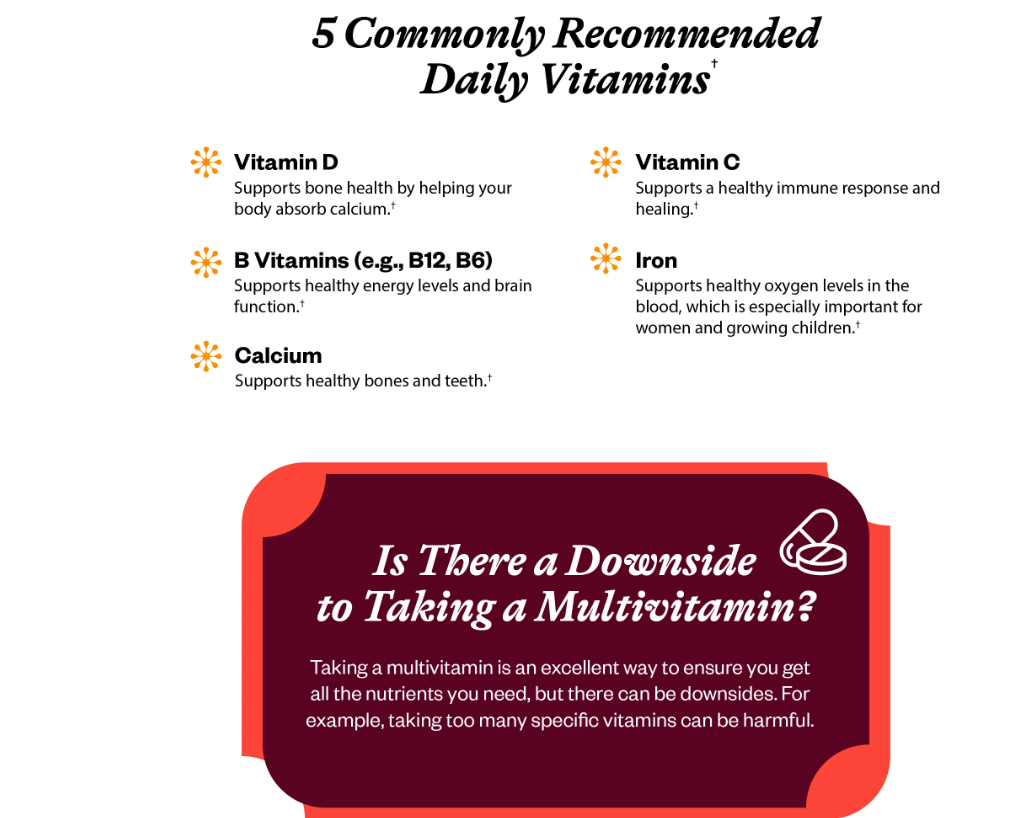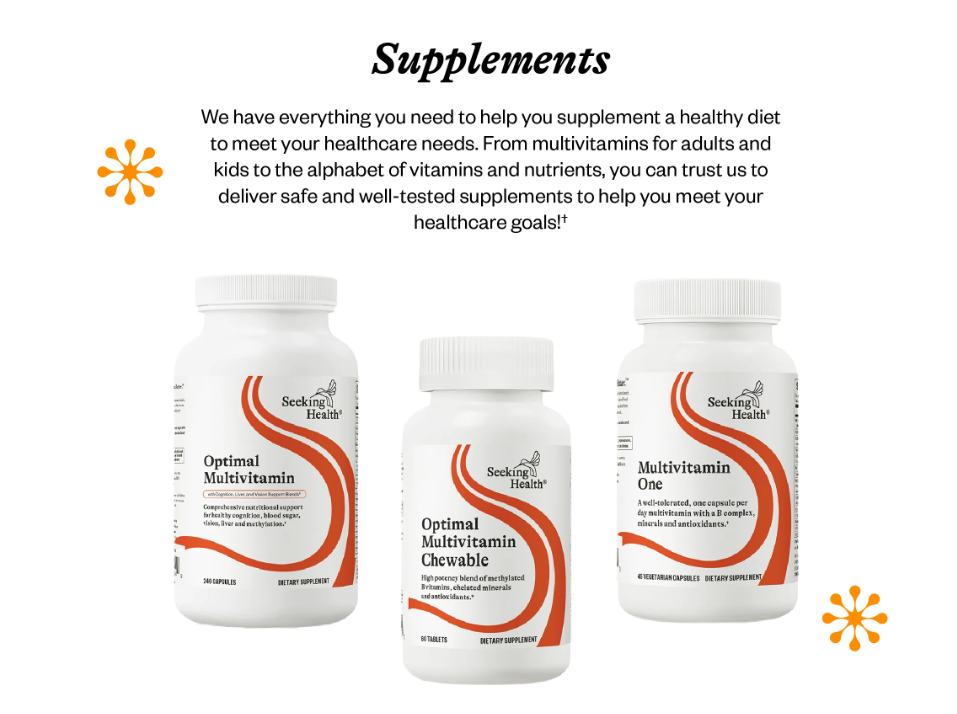Is It Better to Take a Multivitamin or Individual Vitamins?Updated 9 months ago
Written By: Seeking Health
Published At:
When deciding whether to take multivitamins or individual vitamins, it's important to consider your specific health needs.
Multivitamins are convenient because they combine several essential nutrients in one pill, which can help fill gaps in your diet.
On the other hand, taking individual vitamins might be beneficial if you have specific deficiencies. For example, vitamin C and calcium supplements support a healthy blood sugar level, and you may not get enough from just a multivitamin. 1†
It's also important to note that some vitamins, like vitamins A and E, might not offer the expected health benefits when taken as supplements and can even pose risks if consumed in excess.2 Therefore, it's best to consult your healthcare professional to determine what's right for you based on your dietary needs and health conditions.
Pros and Cons of Multivitamins vs. Individual Vitamins
| Multivitamins | Individual Vitamins | |
|---|---|---|
| Pros |
|
|
| Cons |
|
|
Do I Need To Take Other Vitamins if I Take a Multivitamin?
If you take a multivitamin, you might wonder if you still need to take other vitamins separately.
As you learned earlier, multivitamins are designed to provide a broad range of essential nutrients in one convenient pill in addition to a healthy diet. They can support some aspects of health, like healthy cognition and brain function in older adults.4 However, they might only cover some of your nutritional needs if you have specific deficiencies or health conditions. For example, older adults might need extra vitamin D or calcium to support bone health, which might not be in sufficient amounts in a standard multivitamin. 4†
Therefore, it's a good idea to talk to your healthcare professional about your needs to determine if additional supplements are necessary.†
What Is the Best Vitamin To Take Daily?
When choosing the best vitamin to take daily, consider your individual health needs. There isn't one single vitamin that is best for everyone, but certain vitamins are commonly recommended.
For example, vitamin D is important because it helps your body absorb calcium and supports bone health.5 Many people don't get enough vitamin D from food or sunlight alone, so a supplement might be helpful.†
Vitamin C is also popular because it supports your immune system and your body's ability to heal normally.6 B vitamins, like B12 and B6, support healthy energy levels and brain function.7 Again, it's a good idea to talk to your healthcare professional to determine which vitamins you need based on your diet and health.†
5 Commonly Recommended Daily Vitamins†
- Vitamin D: Supports bone health by helping your body absorb calcium.†
- Vitamin C: Supports a healthy immune response and healing.†
- B Vitamins (e.g., B12, B6): Supports healthy energy levels and brain function.†
- Calcium: Supports healthy bones and teeth.8†
- Iron: Supports healthy oxygen levels in the blood, which is especially important for women and growing children.9†
Is There a Downside To Taking a Multivitamin?
Taking a multivitamin is an excellent way to ensure you get all the nutrients you need, but there can be downsides. For example, taking too many specific vitamins can be harmful.
High doses of vitamin A can lead to liver problems and bone issues.10 At the same time, too much vitamin E may increase the risk of bleeding, especially if you take blood thinners.11
Additionally, some people might experience side effects like nausea or diarrhea from taking multivitamins. Your healthcare professional can discuss any health risks you may encounter.
The potential downsides of taking multivitamins include:
- No Significant Health Benefits: Multivitamins might not be necessary if you're not deficient in nutrients.12
- Risk of Overconsumption: Taking too many specific vitamins, like vitamin A or E, can lead to health issues such as liver damage or increased bleeding risk.13
- Side Effects: Some people may experience nausea, diarrhea, or other digestive issues from multivitamins.14
- Interactions with Medications: Multivitamins can interact with certain medications, potentially reducing their effectiveness.
These points highlight why it's essential to consider your specific health needs before taking a multivitamin.
Vitamins & Minerals By Seeking Health
Complete your nutritional needs with Seeking Health’s extensive line of vitamins & minerals. Whether you’re looking for the holistic support of a multivitamin or for targeted, individual nutrient support, we have everything you need to help you supplement a healthy diet to meet your healthcare needs.†
Multivitamin One: A simple yet solid one-a-day multivitamin featuring bioavailable nutrients and antioxidant properties to support healthy aging and stress defenses. Also available in a methyl-free form as Multivitamin One MF.†
Optimal Multivitamin Chewable: A delicious, chewable multivitamin for adults who are on the go and want convenience. Supports methylation with active B vitamins. Also available for kids as Kids Multivitamin Chewable.†
Optimal Multivitamin (formerly Multivitamin Plus): A comprehensive, high-strength daily multivitamin with added liver, vision, antioxidant, and cognition support.†
Iron Chewable: A delicious and gentle form of iron (ferric glycinate) that’s well-tolerated to support healthy oxygen transportation, muscle function, metabolism, and blood cell formation.†
Methyl B12 5000 (formerly Active B12 5000): A potent dose of bioavailable B12 in a delicious lozenge that provides healthy methylation and MTHFR support.†
The Bottom Line
Whether to take a multivitamin or individual vitamins depends on your unique health goals and needs. While multivitamins are a convenient way to fill general nutrient gaps, individual vitamins can address specific deficiencies. To make the best choice, consult a healthcare professional who can guide you based on your diet, lifestyle, and overall health. Seeking Health offers premium, heavily researched ingredients you can always trust for your and your family’s well-being once you know what you’re looking for.†



References:
- https://pubmed.ncbi.nlm.nih.gov/20978095/
- https://ods.od.nih.gov/factsheets/MVMS-HealthProfessional/
- https://pubmed.ncbi.nlm.nih.gov/37244291/
- https://pubmed.ncbi.nlm.nih.gov/32823974/
- https://pubmed.ncbi.nlm.nih.gov/36014856/
- https://pubmed.ncbi.nlm.nih.gov/36009324/
- https://pubmed.ncbi.nlm.nih.gov/31963141/
- https://pubmed.ncbi.nlm.nih.gov/26420598/
- https://pubmed.ncbi.nlm.nih.gov/30855332/
- https://www.ncbi.nlm.nih.gov/books/NBK548165/
- https://pubmed.ncbi.nlm.nih.gov/24166490/
- https://pubmed.ncbi.nlm.nih.gov/28992429/
- https://pubmed.ncbi.nlm.nih.gov/34421176/
- https://pubmed.ncbi.nlm.nih.gov/28101454/
† These statements have not been evaluated by the Food and Drug Administration (FDA). This product is not intended to diagnose, treat, cure, or prevent any disease.